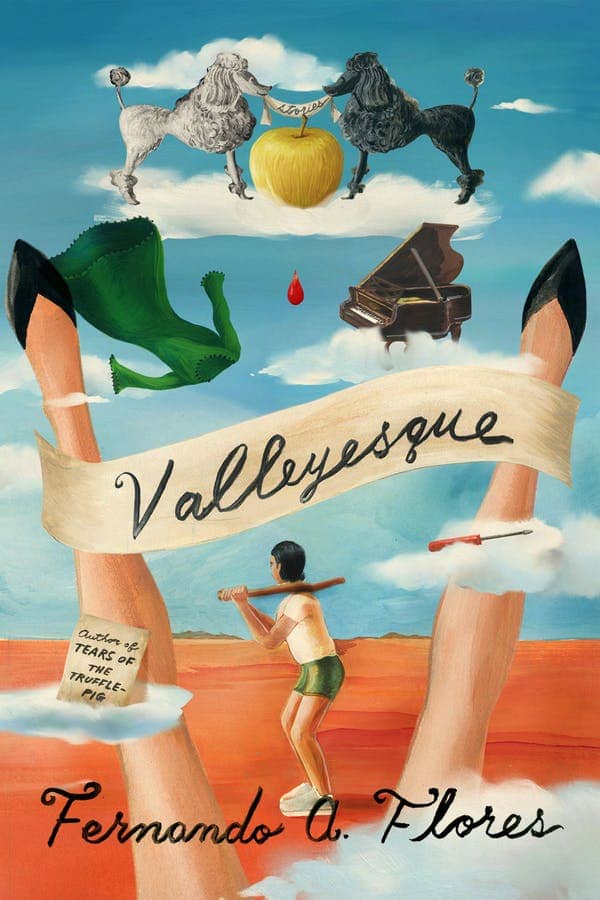Valleyesque: Not Just Weird for Weird’s Sake
Inside the pages of the new anthology from Fernando A. Flores
By Valeria Valdez, 11:20AM, Wed. Jun. 8, 2022

Walking into BookPeople’s signing for Fernando A. Flores’ new novel Valleyesque, I am among the last to arrive. Folks stand along the back row and only two seats remain right up front by the author. I nod at him like we know each other. We don’t, but he looks like someone I could have known back home in Laredo.
Valleyesque draws from Flores’ experience growing up in the Rio Grande Valley. The collection of short stories reads like a memory trace, filled with grief, delight, and rebellion.
At the event, Deb Olin Unferth, writer, professor at UT-Austin, and moderator sat beside him and began by saying, “This book feels like a manifesto.” Flores laughed and admitted that the political aspects of the book were not intentional in the writing process but rather an element that just appears.
Unferth asked Flores how the book’s title came to be, suggesting that the made-up word hints at something “atmospheric but dark yet celebratory.” Flores responded that the word was derived from “Kafkaesque” and that he wanted a title that “wasn’t just weird for weird’s sake but rather vaguely geographical.”
Flores talked about how he began writing as a joke, searching for something to do when he got off work. Stories spawned from thoughts that ran through his mind or things heard while working a barista shift or washing dishes at Justine’s. His typewriter’s ink ribbons would run out too quickly, so he found compromise in writing poems. In reading sections of Valleyesque, it felt clear that it was written through a poetic lens. As he read “Possums,” his voice dipped and drawled in reverent cadence. “I stared into those eyes, like tiny stones dipped in ink […] and those eyes widened like a fault line in the ocean ripping open. From the fault emerged two hazy figures, like smoke out of an air shaft. The figures requested that I follow them in, and inside the possum’s eyes the dark, smoky figures and I had herbal tea.”

Valleyesque, Flores said, will be the last of his books that are set at the border, finishing a trilogy of sorts that includes Death to the Bullshit Artists of South Texas and Tears of the Trufflepig. In this book, Flores attempts to reconnect with “the lost, fantastical and oldest ways of storytelling” while wishing to collaborate with “something deemed to be gone.” He humbly speaks on the surrealist themes that protrude from Valleyesque as aspirations of evading boredom, but the expansive imagination of stories like “Ropa Usada” seems as sentimental as it is entertaining. That story brings to life the disorienting haze prompted by the heat, hustle, bustle, and claustrophobia of a clothing warehouse. Flores animates and creates landscapes from the piles of clothes, transforming the warehouse into an alternate dimension in need of a map. “Think Alice in Wonderland,” Flores said.
As the reading drew to a close, someone in the crowd asked how many of us are also from the border and intoned “Puro 956!” Five of us raised our hands, which surprised us given the book’s setting, but perhaps it was a testament to the ways Flores’ work brings people together.
Valleyesque
by Fernando A. Flores
Macmillan, 208 pp., $16 (paper), $9.99 (e-book)
Read about the musical influences on Valleyesque in this week’s “Faster Than Sound.”
For more on Fernando A. Flores, you can follow him on Instagram: @f.a.flores.
A note to readers: Bold and uncensored, The Austin Chronicle has been Austin’s independent news source for over 40 years, expressing the community’s political and environmental concerns and supporting its active cultural scene. Now more than ever, we need your support to continue supplying Austin with independent, free press. If real news is important to you, please consider making a donation of $5, $10 or whatever you can afford, to help keep our journalism on stands.
Sept. 9, 2022
Valleyesque, Fernando Flores, MacMillan








